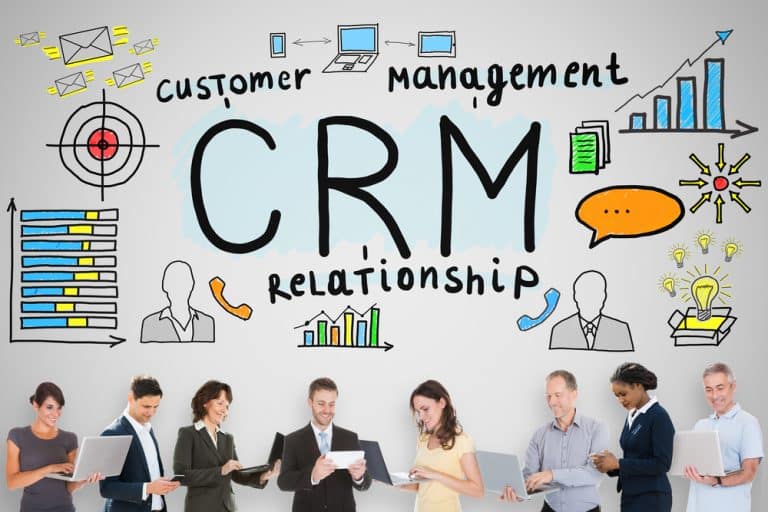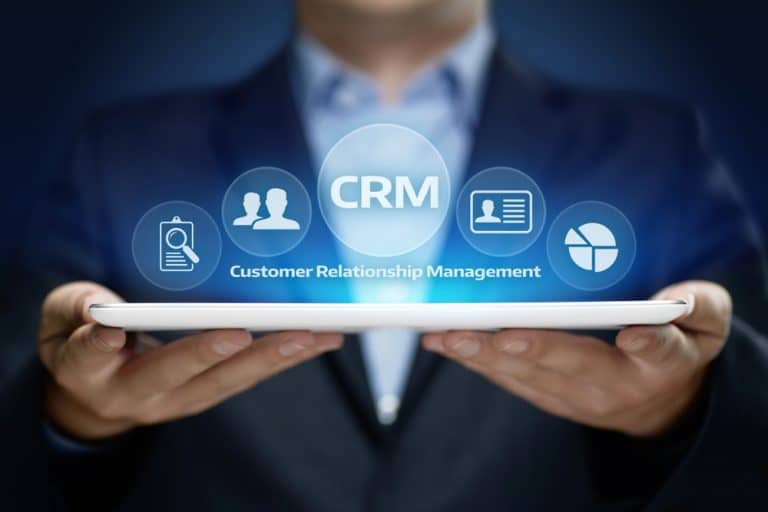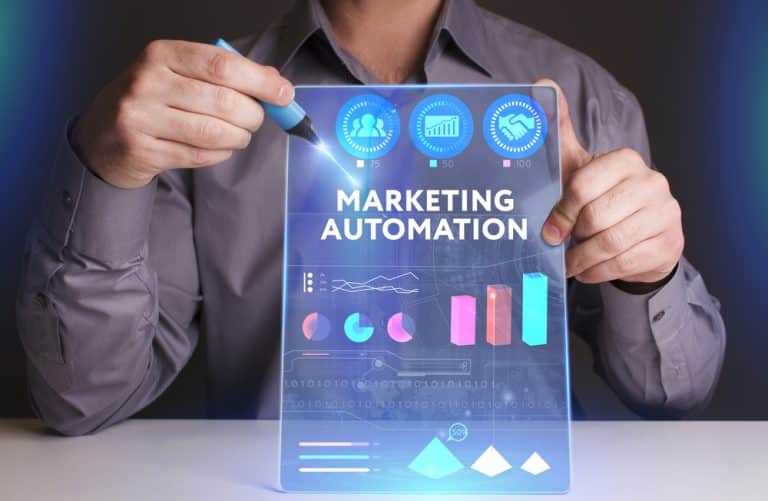Automation in CRM
Workflow automation doesn’t get much credit, but it sure is one of the most revolutionary innovations in business in the past century. The ability to track and store customer interactions, automate tasks and processes, and manage communications has changed the way businesses operate.
Practically everything can be automated, i.e., emails, tasks, appointments, social media interactions, and even phone calls.
Business owners, managers, company executives, and supervisors have all realized the importance of automation in CRM and are now using it to improve customer relations and business efficiency.
One of the most important advantages of automation is that it can help you keep track of your customer interactions. By automating your tasks, processes, and communications, you can easily store customer information and histories. This way, you can easily access customer records and understand their needs better.
CRM refers to Customer Relationship Management. It’s a concept that helps companies manage their customer interactions and data. It’s a principle attached to multiple industries and business sizes. The bottom line is, if you have customers, you need CRM.
Why Automate CRM?
Customer management tasks are always redundant. It means they must be carried out no matter how tedious and inefficient they become.
Productivity often suffers as a result. In some cases, employees become so bogged down with doing the same thing over and over that they make errors.
It’s only natural to ponder if there’s a better way to get the job done. The good news is, there is! Businesses today have access to an array of workflow automation tools that can take care of the mundane, repetitive tasks for them.
When you automate your CRM, you free up your employees to focus on more important things, like developing relationships with customers and growing the business.
Automating your CRM corresponds to a vastly improved customer satisfaction rating. It’s possible since you can now focus on your customer’s needs, rather than managing their data.
It also allows you to scale your business quickly and easily. You can add new customers without having to worry about how you’re going to keep track of them all.
The best part is, once you set up your automation rules, the system will do the rest for you.
How to Automate CRM?
Now that we’ve established why you should automate your CRM, it’s time to take a look at how you can do it.
You’re offered several ways to automate your CRM, but we’re going to focus on the three most popular methods:
- Use an email marketing service
- Use a task management tool
- Use a customer relationship management software
Email Marketing Service
One of the most convenient ways to automate your CRM is to use an email marketing service.
This type of service will allow you to automatically send emails to your customers based on certain criteria.
For example, you can set up an email campaign that sends a welcome email to new customers. Or, you can create an automated email sequence that promotes a new product or service.
There are many different email marketing services to choose from, so be sure to do your research before settling on one.
Task Management Tool
Another great way to automate your CRM is to use a task management tool.
This type of tool will allow you to automate tasks and processes so that they’re carried out automatically.
For example, you can use a task management tool to automatically assign tasks to employees based on their skillset. Or, you can use it to create reminders for upcoming events.
There are many different task management tools to choose from, so be sure to do your research before settling on one.
Customer Relationship Management Software
The third and final method we’ll be discussing is using a customer relationship management software.
This type of software will allow you to automate all of your customer interactions, including sales, marketing, and customer service.
For example, you can use a CRM software to automatically create a customer profile when they make a purchase. Or, you can use it to track customer interactions and follow-up accordingly.
There are many different CRM software to choose from, so be sure to do your research before settling on one.
Once you understand the value of CRM for companies that cater to customers, the next question on your mind is this: why would I invest in automation in CRM?
The answer is pretty simple – to make your interactions with customers more efficient and streamlined. The workflow automation features in CRM systems help businesses by:
- Tracking customer interactions: All information about a customer is stored in a central location. This includes contact information, communication history, sales data, and more.
- Automating tasks and processes: By automating repetitive tasks, businesses can free up time and resources to focus on more important tasks.
- Managing communications: CRM systems provide a platform for managing customer communications. This includes email, phone calls, social media interactions, and more.
- Improving customer relations: Automation in CRM can help businesses improve their customer relations. Recognizing customer needs and preferences implies businesses can provide better customer service.
- Increasing business efficiency: Automation in CRM can help businesses increase their efficiency by streamlining tasks, processes, and communications.
- Reducing costs: Automation in CRM can help businesses reduce their costs by eliminating the need for manual labour.
Enhancing decision-making: Automation in CRM can help businesses enhance their decision-making by providing data-driven insights.
Be reminded that these are merely some of the hundreds of advantages of automation in CRM. If you want to improve your customer relations and business efficiency, then you should consider investing in automation in CRM.
Issues in CRM Automation
We can’t proceed to the detailed discussion on the many aspects of CRM automation without having a fair idea about the issues in CRM automation. Issues are bound to crop up in any business operation and this is especially true in case of businesses that have just started to automate their CRM processes.
The three most common issues in CRM automation are:
- Data loss: One of the biggest issues with CRM automation is data loss. This can happen due to various reasons, such as user error, system glitches, and more. To avoid data loss, it’s important to have a backup plan in place.
- Implementation difficulties: Another issue with CRM automation is the difficulty in implementation. There’s a prospect of it happening due to a lack of understanding of the automation process, lack of training, and more. To avoid implementation difficulties, it’s important to have a clear plan and adequate training in place.
- System errors: Another issue that can occur with CRM automation is system errors. This can happen due to various reasons, such as incorrect data entry, compatibility issues, and more. To avoid system errors, it’s important to have a robust testing plan in place.
CRM automation offers a powerful solution for businesses improve their customer relations and business efficiency. However, it’s important to be aware of the issues that can occur with CRM automation. By having a clear plan and adequate training in place, businesses can avoid these issues.
But the one elephant in the room we need to address is this – are the advantages of automation in CRM worth the issues? The short answer is yes. The long answer is – it depends on your business needs.
For example, if you’re a small business that’s just starting to automate your CRM processes, then you might experience some issues. But if you’re a large enterprise with a complex CRM system, then you might not experience any issues.
It all depends on your business needs. But in general, the advantages of automation in CRM outweigh the disadvantages.
CRM with Marketing Automation
Any business that has relied on CRM before will never be able to thrive without it. However, there eventually comes a time when the traditional manner of handling CRM-related tasks is no longer efficient and viable.
As such, automating those tasks makes the most sense from the perspective of time-saving and effort reduction. Marketing automation is one of the most commonly used methods for automating tasks in CRM.
Marketing automation is the process of using software to automate marketing tasks. It includes an extensive array of activities, such as email marketing, social media marketing, lead generation, and more.
Many businesses have started to invest in marketing automation to supplement their CRM efforts. Marketing automation is a tool that helps businesses automate their marketing tasks, such as email marketing, social media marketing, and more.
While marketing automation is an indispensable tool that can help businesses improve their customer relations and business efficiency, it’s important to be aware of the issues that can occur with marketing automation.
For example, if you’re a small business that’s just starting to automate your marketing tasks, then you might experience some issues. But if you’re a large enterprise with a complex marketing automation system, then you might not experience any issues.
The goal of combining CRM with marketing automation is to create a system that is more efficient and effective than the traditional methods of handling CRM-related tasks. Automated customer service translates to a better customer experience, and in turn, improved customer retention rates.
Reducing Customer Service Costs
It’s no secret that clients serve as the lifeblood of any business. After all, without customers, businesses would have no one to sell their products or services to.
While customer acquisition is important, it’s also important to focus on customer retention. In fact, multiple research and studies have shown that it costs five times more to acquire a new prospect than it does to retain a current one.
One of the best ways to reduce customer service costs is to automate as many tasks as possible. Automated customer service can help businesses save time and money by handling simple tasks, such as answering frequently asked questions, scheduling appointments, and more.
When combined with live customer service, automated customer service can help businesses provide a more efficient and effective customer experience.
For instance, HighLevel, an all-in-one sales and marketing platform, offers a live chat feature that allows businesses to provide customer support and sell products or services in real-time.
HighLevel also offers an automated email marketing feature that helps businesses stay in touch with their customers and prospects without the usual task of manually send out each email.
The company helps you get rid of the usual “duct tape” solution and provides you with an AI-powered sales assistant to automate your sales tasks.
Improved Customer Engagement
In today’s business world, customers have more choices than ever before. As such, it’s important for businesses to focus on providing an engaging and positive customer experience.
While marketing has always been about promoting a product or service, automation in CRM will make businesses realize that they, too, must focus on improving their relationship with their clients. Doing so will help them build a more loyal customer base.
It’s important to note that automated customer service is not a replacement for live customer service. Instead, it ought to be used as a supplement to provide an even better customer experience.
For one, if a customer calls your business with a question, you can use an automated system to route the call to the right department.
But, if the customer needs to speak to a live person, you can use the same system to connect them with a customer service representative.
In addition to providing better customer service, automated CRM systems can also help businesses improve their customer engagement.
For instance, by using an automated system to track customer interactions, businesses can gain valuable insights into what their customers want and need.
Workflow management software is used to create and manage workflows. It can automate tasks and processes by creating rules and triggers. Intelligent process automation software is used to automate complex processes. It uses artificial intelligence and machine learning to automate tasks. Robotic process automation software is built specifically to automate repetitive tasks. It uses bots or robots to carry out the task.
BPA can be a game-changer for businesses. It can improve accuracy, overall operational efficiency, speed, and consistency while also reducing operating costs. To succeed, businesses don’t have a choice but to invest in the right software and tools.
Marketing Automation Software
Anyone who must work tirelessly to market a business knows that it’s a never-ending process of trying new tactics, measuring results, and making adjustments. It can quickly become overwhelming, leaving little time to focus on other important aspects of running a business.
There’ve been countless instances when businesses had to choose between two less-than-ideal options: either spend too much time on marketing and risk other areas of the business suffering, or neglect marketing altogether and watch the business slowly dwindle.
But your business doesn’t have to make that choice. With the help of a CRM software, your marketing team gets to say goodbye to the mundane, time-consuming tasks that take away from their creativity, and hello to higher efficiency and increased productivity.
A marketing automation software automates and simplifies repetitive tasks so that your marketing team can focus on more important things, like strategy and content creation.
The best CRM and marketing automation software includes a variety of features, such as lead generation, email marketing, social media management, and campaign tracking.
When used together, these features can help businesses attract new customers, convert leads into customers, and retain existing customers.
Lead Generation
One of the most critical aspects of marketing is lead generation. Without leads, there would be no one to market to.
A lead refers to someone who shows interest in your product or service. However, not all leads are created equal.
Some leads are usually more qualified than others, which is why it’s important to have a system in place to track and nurture leads until they’re ready to buy.
This is where lead generation comes in. Lead generation is the act of attracting and converting strangers into leads.
There are a number of ways to generate leads, such as through content marketing, social media, paid advertising, and search engine optimization.
Acknowledging the best lead generation strategy for your business will depend on your budget, your target audience, and your goals.
Email Marketing
Email marketing is arguably one of the most effective marketing channels. It allows you to reach a large audience at a fraction of the cost of other marketing channels.
Likewise, email is a great way to build relationships with your customers and keep them updated on your latest products and offers.
The crucial tenet to email marketing is to make sure your emails are relevant and valuable to your audience. Otherwise, you run the risk of your emails being ignored or even worse, marked as spam.
To guarantee your email marketing campaign’s success, there are a few things you should keep in mind, such as segmenting your list, using personalization, and creating compelling subject lines.
Social Media Management
Social media is one of the most effective marketing channels for building brand awareness and generating leads.
However, it can also be time-consuming. It’s the reason why it’s important to have a social media management strategy in place.
The first step is to choose the right platform for your business. There’s no point in being on every social media platform if your target audience isn’t present.
Once you’ve chosen the right platform, you need to create engaging content that will resonate with your audience.
And finally, you need to measure your results so that you can adjust your strategy as needed.
Campaign Tracking
Once you’ve launched your marketing campaign, it’s important to keep track of your results. This way, you can see what’s working and what isn’t and make necessary changes.
Campaign tracking is the process of measuring the performance of a marketing campaign. There are a number of metrics you can track, such as leads generated, conversion rate, click-through rate, and cost per lead.
By tracking these metrics, you can get a better understanding of your campaign’s effectiveness and make necessary changes to improve your results.
Marketing Campaigns
By now, you’re probably wondering what marketing campaigns can you launch with the help of automation software.
The answer is, any kind of campaign!
Whether you’re looking to launch a new product, promote a sale, or simply build brand awareness, marketing automation can help.
Here are a few ideas to get you started:
New Product Launch Campaign
If you’re launching a new product, you’ll want to create a campaign that will generate excitement and build buzz. To do this, you’ll need to create high-quality content, such as blog posts, infographics, white papers, and eBooks. You should also consider running a social media campaign and email marketing campaign.
Sale Promotion Campaign
If you’re looking to promote a sale, you’ll want to create a campaign that will drive traffic to your website or store. To do this, you can use a variety of marketing channels, such as paid advertising, social media, email marketing, and content marketing.
You should also consider running a contest or offer a discount to increase your chances of driving sales.
Brand Awareness Campaign
If you’re looking to build brand awareness, you’ll want to create a campaign that will reach a large audience. To do this, you can use paid advertising, social media, email marketing, and content marketing.
You should also consider running a contest or offer a discount to increase your chances of driving sales.
Customer Retention Campaign
If you’re looking to retain your existing customers, you’ll want to create a campaign that will keep them engaged. To do this, you can use email marketing, social media, and content marketing.
You should also consider running a contest or offer a discount to increase your chances of driving sales.
Lead Generation Campaign
If you’re looking to generate leads, you’ll want to create a campaign that will reach your target audience. To do this, you can use paid advertising, social media, email marketing, and content marketing.
You should also consider running a contest or offer a discount to increase your chances of driving sales.
The bottom line is that marketing automation can help you launch any kind of marketing campaign. So, if you’re looking to take your marketing to the next level, consider using automation software.
Marketing Automation Tools
No matter how hardworking your marketing people are, there’s no denying the fact that they can only work a maximum of 24 hours a day, and that’s already workplace abuse right there.
CRM software and marketing tools are designed to help marketing professionals work more efficiently by automate certain tasks, such as email marketing, social media posting, and lead generation. Most importantly, automation cuts the time required
There is a bevy of marketing automation tools available on the market:
HighLevel is an all-in-one marketing automation tool that helps businesses automate their marketing and administrative tasks and increase their ROI. The company helps businesses generate leads by automatically adding new contacts to their CRM software.
Furthermore, HighLevel allows businesses to send automated emails to their contacts, which can help increase sales and revenue. Lastly, the company provides businesses with real-time insights so they can make the necessary changes to their marketing campaigns.
Hootsuite, a popular social media management platform, allows users to track all their social media channels in one place. It also provides users with powerful tools to help them measure their social media performance.
Marketo is an intuitive CRM software that allows users to automate their marketing tasks. It’s a powerful tool with access to a wide range of features, such as email marketing, lead management, and analytics.
Pardot is a B2B marketing automation tool that allows users to create beautiful email campaigns, landing pages, and forms. It also provides users with powerful tools to help them measure their marketing performance.
GetResponse is an all-in-one marketing platform that provides users with everything they need to create beautiful email campaigns, landing pages, and forms.
HubSpot delivers a powerful marketing and sales platform that allows users to track their leads, customers, and prospects in one place. It also provides users with powerful tools to help them measure their marketing performance.
Omnisend is an ecommerce marketing automation tool that helps businesses send automated emails, SMS messages, and push notifications. It also provides users with powerful tools to help them segment their contacts and personalize their messages.
ActiveCampaign is an all-in-one marketing and sales platform that allows users to automate their marketing tasks. It also provides users with powerful tools to help them segment their contacts, personalize their messages, and track their marketing performance.
Drip is a powerful ecommerce marketing automation tool that allows users to send automated emails, SMS messages, and push notifications. It also provides users with powerful tools to help them segment their contacts and personalize their messages.
Every CRM software and marketing automation tools comes with highly valuable features that can help businesses automate their marketing tasks. Having said that, you must pick the right tool based on a bevy of factors, including but not limited to:
Type of Business
Your niche or the industry where you belong to can help you identify the right marketing automation tool for your business. For example, if you’re in the B2B industry, then Pardot or HubSpot should be on your radar. The reason why this is crucial is because each marketing automation tool is designed to meet the specific needs of a certain type of business.
Business Goals
Your business goals will also dictate the kind of marketing automation tool you should go for. For example, if your goal is to increase sales and revenue, then you should go for a tool that provides users with powerful tools to help them measure their marketing performance, such as Marketo or HubSpot.
Budget
Your budget is another important factor that you need to consider when choosing a marketing crm integration tool. You get to select a few free and paid tools available in the market, so you ought to pick one that fits your budget.
Ease of Use
The CRM software and marketing automation tool you choose should be easy to use and should have a user-friendly interface. It’s crucial since you don’t want to waste your time trying to figure out how the tool works.
Customer Support
The CRM software you choose should have excellent customer support. This is important because you want to be able to get help from the company if you stumble upon any issues while using the tool.
Integration
The marketing automation tool you choose should be able to integrate with the other tools and applications you use. This is important because you want to be able to automate your marketing tasks without having to use multiple tools.
Scalability
The marketing automated workflows you choose should be scalable. This is important because you want to be able to grow your business without having to worry about the tool being unable to handle your increased workload.
Features
The CRM and marketing automation tool you choose should have the features you need. This is important because you don’t want to pay for a tool that doesn’t have the features you need.
Security
The marketing automation tool you choose should be secure. This is important because you want to make sure that your data is safe and secure.
Pricing
The CRM software and marketing automation tool you choose should have a pricing model that fits your budget. This is important because you don’t want to overspend on a tool that you’re not going to use.
After taking all of these factors into consideration, you should be able to identify the right marketing automation tool for your business.
Frequently Asked Questions
Automating your CRM means a world of difference to the entirety of your operation. It enables your team to work smarter by automating processes and gives you the ability to nurture your leads better so that more prospects are converted into paying customers.
1 – Improved Sales Cycle
Deploying a CRM software and marketing automation tool helps your salespeople focus on the right leads, at the right time. In other words, it enables your team to work smarter by automating processes and gives you the ability to nurture your leads better so that more prospects are converted into paying customers.
2 – Increased Customer Satisfaction
The luxury of having a 360-degree view of your customer means you get to provide them with a better overall experience. This ultimately will lead to increased customer satisfaction and loyalty.
3 – Greater Efficiency
CRM systems help you automate repetitive processes so that your team can focus on more important tasks. This results in greater efficiency and productivity.
4 – More Informed Decision-Making
With a CRM software in place, you have all the data you need to make informed decisions about your business. It’ll help you avoid making costly mistakes and enables you to make decisions that are in the best interests of your company.
5 – Improved Customer Retention
By providing your customers with a better overall experience, you can improve customer retention. This, in turn, leads to increased revenue and profitability.
6 – Greater Scalability
As your business grows, you’ll need a CRM automation software that can grow with you. Otherwise, you’ll quickly outgrow your current system and will be forced to invest in a new one.
7 – Access to New Markets
With a CRM and marketing automation platform, you can easily expand into new markets and reach new customers. This helps you grow your business and achieve your long-term goals.
8 – Increased Customer Lifetime Value
This translates to more revenue and profitability for your business.
9 – Improved ROI
Investing in a CRM and marketing automation system can help you improve your return on investment (ROI) centered on marketing and sales. This is because you’ll be able to increase sales and reduce costs at the same time.
10 – Competitive Advantage
By automating your CRM, you’ll be able to gain a competitive advantage over your rivals. This is because you’ll be able to better manage your customer data and offer a more personalized experience to your customers through the entire sales funnel.
CRM automation generally has a two-fold purpose:
1. To make your team more efficient and effective
2. To improve the customer experience
Both of these benefits can lead to increased sales and profitability for your business by taking full advantage of marketing and sales. It seeks to afford a marketing automation integration solution unlike any other. It is meant to empower businesses and radically change the way they interact with their customers.
The modern customer interacts with businesses in a very different way than they did even just a decade ago. It’s important for businesses to adapt to these changes so that they can remain competitive. This is where CRM and marketing automation holds a ton of value.
There are a few key functions that CRM and marketing automation can perform for businesses. These functions are:
1. Lead Nurturing: Perhaps the most important function of CRM automation is lead nurturing. This is the process of taking leads that have shown an interest in your product or service and turning them into paying customers.
Furthermore, lead nurturing can also help you keep your current customers happy so that they continue to do business with you. A happy customer is an essential ingredient in the recipe for success for any business. Without a happy client, there isn’t any business.
2. Drip Campaigns: Drip campaigns are a type of lead nurturing. They involve sending a series of emails to leads over a period of time. These emails contain valuable content such as crm data that educates the lead about your product or service and eventually converts them into paying customers by providing details of your marketing processes.
For an organization to successfully implement drip campaigns, they need a CRM system that can automate the process. It goes without saying that manually sending out a series of emails to hundreds or even thousands of leads is not an effective use of time.
3. Lead Scoring: Lead scoring is defined as the process of assigning a score to each lead based on the prospect of becoming a paying customer. This helps sales teams prioritize their time so that they’re spending more time with more leads that are more likely to convert.
4. Sales Pipeline Management: A sales pipeline is the process that a lead goes through from the initial contact to becoming a paying customer in the sales process.
CRM and marketing automation can help sales teams manage their sales pipeline by keeping track of where each lead is in the process and what needs to be done to close the deal.
5. Reporting and Analytics: The best marketing automation software can also help businesses generate reports and analytics about their sales and marketing processes. This information is potentially useful in improving the efficiency of the sales team and making more informed decisions about where to allocate resources in the sales cycle.
6. Data Management: Another key function of CRM and marketing automation is data entry and management. This includes storing, organizing, and accessing customer data.
One of the notable perks of having a CRM system is that it gives you a centralized place to store all your customer data. This makes it easier for you to access the information you need when you need it.
7. Customer Segmentation: Customer segmentation is the process of dividing your customer base into groups based on shared characteristics. This is a valuable marketing strategy because it allows you to create targeted marketing campaigns that are more likely to convert.
8. Customer Journey Mapping: Customer journey mapping is the process of tracking the interactions that a customer has with your business, from the initial contact to becoming a paying customer.
This is a valuable tool for businesses because it helps you understand the customer’s needs and how you can better serve them through improved sales processes.
9. Social Media Integration: social media is a powerful marketing tool that can be used to reach a large audience.
CRM and marketing automation can help businesses integrate their social media accounts so that they can more effectively use this channel to reach their target market and manage customer data.
10. Mobile CRM: Mobile CRM is a type of CRM that is designed for use on mobile devices such as smartphones and tablets. Also, it allows marketing teams to keep track of their customer relationships while on the go.
CRM automation does more than just improve the efficiency of your sales team. It can also help you generate reports and analytics, segment your customers, track their journey, and integrate with social media. It’s a powerful software designed to improve your team’s performance in key aspects of the sales and marketing departments, including:
1. Contact and Lead Management: CRM systems help businesses keep track of their contacts and leads via their sales and marketing teams. This information can be used to follow up with potential customers, lead scoring, and close deals.
2. Drip Campaigns: Drip campaigns are a type of lead nurturing. They involve sending a series of emails to leads over a period of time. In order to effectively do this, automation must be incorporated for your marketing efforts.
3. Lead Scoring: Lead scoring, by definition, is the process of assigning a score to each lead based on the chance of converting them into a customer. This helps sales teams prioritize their time so that they’re spending more time with high-quality leads that are more likely to convert.
4. Sales Pipeline Management: A sales pipeline is the process that a lead goes through from the initial contact to becoming a paying customer.
CRM automation marketing software can help sales teams manage their sales pipeline by keeping track of where each lead is in the process and what needs to be done to close the deal by producing more leads.
5. Reporting and Analytics: CRM automation can also help businesses generate reports and analytics about their sales process. It’s valuable info meant to improve the efficiency of the sales team and make more informed decisions about where to allocate resources.
Salesforce automation is the process of using software to automate sales-related tasks. It usually incorporates contact management, lead management, pipeline management, and reporting to improve customer satisfaction. Salesforce automation helps businesses improve their sales efficiency by streamlining repetitive tasks and providing valuable insights into the sales process.
CRM (customer relationship management) is a term that essentially describes the strategies and technologies that businesses use to manage their customer relationships. Marketing automation is a type of software that helps businesses automate their marketing campaigns. It can be used to track customer interactions, segment customers, and create targeted marketing messages.
There are a few different types of CRM software that can be used for marketing automation. Some of the most popular include HighLevel, Salesforce, HubSpot, and Zoho. Every CRM software offers a unique take on tackling marketing automation. As such, your responsibility is to figure out which one best suits your needs.
Marketing automation and CRM platforms are two terms that are often used interchangeably. However, they are not the same thing. CRM points to the strategies and technologies that businesses use to manage their customer relationships. Marketing automation is a type of software that helps businesses automate their marketing campaigns.
CRM platforms and marketing automation are important because they help businesses manage and improve customer satisfaction and automate their marketing campaigns. These tools can help businesses improve their sales efficiency, close more deals, and generate valuable insights into their customers.
Client Testimonials





















